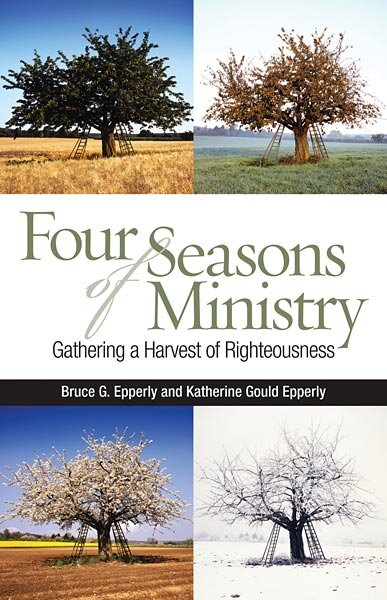Bruce G. Epperly and Katherine Gould Epperly, Four Seasons of Ministry: Gathering a Harvest of Righteousness. Alban Institute, 2008.
Referenced in: Minister Self-Care
LifeandLeadership.com Summary
The authors offer great insight into how ministers may realize their greatest contribution in each phase of their lives. They express these phases as four seasons of ministry:
Springtime – This is where the minister discerns call, develops gifts, and receives training (the writers assume the seminary context). The challenges during this period are to integrate the overwhelming amount of knowledge into a beneficial whole (theological reconstruction), and to cultivate the life habits that lay the foundation for life-long self-care. Necessary components during this time are mentors, good nutrition, exercise, prayer, and Sabbath.
Summertime – This is where one experiences the large dose of growth and learning associated with the new call. Early exhileration is usually replaced with feelings of inadequacy. Important tasks include surrounding oneself with stimulating colleagues, crafting a life vision, stewarding one’s relationships, exercising an appropriate degree of pastoral authority, and replacing the false benchmarks of perfection with the mandate of faithfulness. They offer a good question to guide this phase: “Will your spouse, partner, children, and closest friends also thank God for your calling into ordained ministry?” (86)
Autumn – This brings the mid-career challenges that lead either to transformation or failure. Any developmental issues not dealt with adequately in previous stages may be accentuated now, leading to even worse forms of perfectionism, deep regret, and burnout that can derail a ministry. Important tasks include continuing education, self-awareness, grieving, resisting perfectionism, and aligning with a personal coach.
Winter – This is the season of retirement, but whether it is exciting or discouraging depends on how one is able to redefine one’s calling and role at this stage. Important tasks include creatively entering new ministries, celebrating life accomplishments, forgiving past hurts, being grateful, receiving honest praise, and sharing wisdom.
From the Publisher
Ministers often find themselves caught in the day-to-day pressures of leading a congregation and yearn to experience the unfolding of their professional lives from a larger perspective. Four Seasons of Ministry serves as a guide for what you will find on your ministerial journey and gives meaning to the routine and repetitive tasks of ministry. Authors Bruce G. and Katherine Gould Epperly each of whom has over 25 years of experience in various pastoral roles, invite clergy to see their ministries in the present as part of a life-long adventure in companionship with God, their loved ones, and their congregations.
There is a time and a season to every ministry. Healthy and vital pastors look for the signs of the times and the gifts of each swiftly passing season, but they also take responsibility for engaging the creative opportunities of each season of ministry. Those who listen well to the gentle rhythm of God moving through their lives and the responsibilities and challenges that attend the passing of the years, vocationally as well as chronologically, will be amazed at the beauty and truth that shapes and characterizes the development of their ministries.
About the Author
Bruce G. Epperly serves as Director of Continuing Education and Professor of Practical Theology at Lancaster Theological Seminary and is ordained in the United Church of Christ and the Christian Church (Disciples of Christ).
Katherine Gould Epperly is also an ordained minister in the Christian Church (Disciples of Christ) and the United Church of Christ. Together, Bruce and Kate serve as co-pastors of Disciples United Community Church in Lancaster, Pennsylvania.
See Other Resources on Minister Self-Care and Preventing Burnout:
- Minister Self-Care
- Ministry Burnout, Preventing and Overcoming
- Ministry Support Systems
- Strengthening and Renewing the Ministry Call
- Pastoral Theology
See Resources on Over 100 Ministry Topics:


